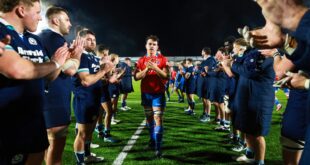Teams, players and supporters are counting down the days until Rugby World Cup 2023. As it draws closer to beginning a continued complaint is that the draw is not balanced. Top ranked teams are not distributed evenly across the four pools.
World Rugby made the draw early. They made an error and admitted to doing so. The draw used World Rankings from December 2020. Having done so, the outcome is that three of today’s top five are in one group. One of South Africa (4th), Ireland (1st) and Scotland (5th) will not reach the Quarter Finals.
The above example shows that the RWC 2023 pools lack parity. It has happened in prior World Cups without action being taken. It is not an isolated instance of World Rugby not having balanced patterns over the running of the Rugby World Cup.
As this article will argue, how teams qualify for the Rugby World Cup is a case of global unbalance. Twenty teams will compete at Rugby World Cup 2023. Twelve of them (60%) did not compete in Rugby World Cup qualifiers.
France qualified as the host country. Eleven others qualified by finishing in the top three of their pools at Rugby World Cup 2019. They are Argentina, Australia, England, Fiji, Ireland, Italy, Japan, New Zealand, Scotland, South Africa and Wales.
The eight other participants earned the right to compete. Namibia qualified as Africa 1, Uruguay as Americas 1, Chile as Americas 2, Samoa as Oceania 1, Tonga as Asia / Pacific 1, Georgia as Europe 1, Spain as Europe 2, and Portugal as the repechage winner. Portugal replaced Romania as Europe 3 in repechage after Spain was disqualified from the World Cup and replaced by Romania.
A lot has been said about Spain’s disqualification. It followed World Rugby changing eligibility laws to not tighten-down but to loosen laws. Under Bill Beaumont’s command World Rugby has no problem with teams fielding players from different senior national teams; however, it disqualified Spain for fielding a player who lied. Gavin van den Berg played 30 minutes for Spain in two matches in which Los Leones won effortlessly. In short, Spain vs Netherlands were unsubstantial games.
Spain’s pathway to qualifying was not easy. Spain faced RWC 2019 and / or 2023 participants Georgia, Portugal, Romania and Russia. Namibia did not face a team that has played in the World Cup since Spain did so in 1999. The comparative cases of European and African pathways to the World Cup demonstrate a global qualifying unbalance.
Europe is not alone. World Rugby also advantages Africa over the Americas. The two American continents are put together. Uruguay was unbeaten in South American qualifiers but World Rugby denies the South American champions direct qualification. While Namibia earned their spot through only facing Africa opposition, Los Teros qualified by defeating the North American champions the USA on aggregate.
RWC 2023 will be the first Men’s Rugby World Cup without a North American competitor. Chile’s historic qualification came after beating both Canada and the USA. Is this due to Canada and the USA not being good enough, or is it because Africa’s champions are entitled to what North Americans and South Americans are not?
All teams at a World Cup ought to qualify; that is to say rugby needs genuine Qualifiers. Not only are qualifiers sporting but they are in the interests of the global game. Georgia do not have a pathway to the Six Nations but defeated both Italy and Wales in 2022 and the Lelos will face Wales at Rugby World Cup 2023 as will Portugal. Why is there no European Cup featuring a Top 8 or Top 10 in a tournament of two pools to determine seedings and to crown a European champion?
Why have talks of Rugby World Cup expansion stopped? The Men’s Rugby World Cup could expand from 20 to 24 teams. Canada, USA, Russia and Spain are notable absentees from Rugby World Cup 2023.
As argued in this article, the global qualifying unbalance sees the Americas and Europe at a disadvantage. The outlook of regional progression in these regions is better than others where regression has been and will continue to be a larger factor.
 Americas Rugby News Rugby news from across the Americas!
Americas Rugby News Rugby news from across the Americas!




